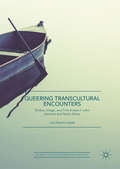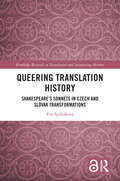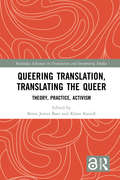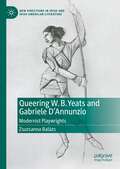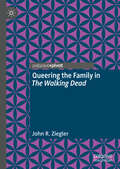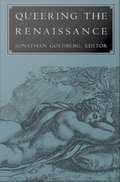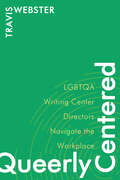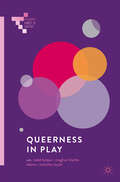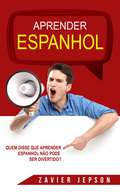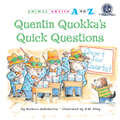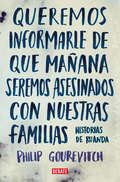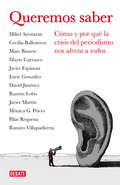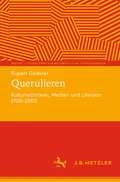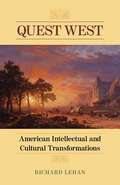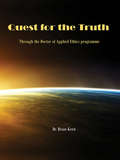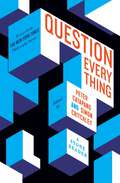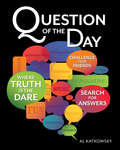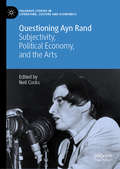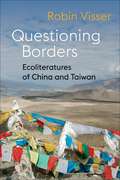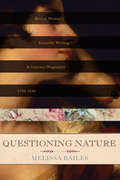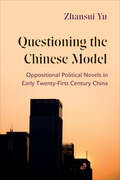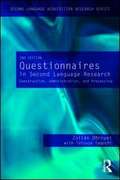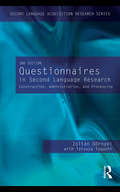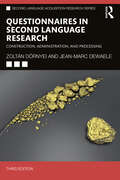- Table View
- List View
Queering Transcultural Encounters: Bodies, Image, and Frenchness in Latin America and North Africa (Palgrave Studies in Globalization and Embodiment)
by Luis Navarro-AyalaIn a highly original and interdisciplinary work bridging French and Francophone studies, cultural studies, media studies, and gender and sexuality studies, Luis Navarro-Ayala examines the transnational queer body as a physical and symbolic entity intrinsically connected with space. Through a transcultural and intersectional approach to bodily representations, socioeconomic conditions, and postcolonial politics, Navarro-Ayala analyzes queerness and Frenchness in narratives from North Africa and Latin America, revealing that Frenchness is coded to represent a sexually deviant “Other.” France and Frenchness, in two distinct regions of the global South, have come to represent an imagined queer space enabling sexual exploration, even in social conditions that would have otherwise prevented queer agency.
Queering Translation History: Shakespeare’s Sonnets in Czech and Slovak Transformations (Routledge Research on Translation and Interpreting History)
by Eva SpišiakováThis innovative work challenges normative binaries in contemporary translation studies and applies frameworks from queer historiography to the discipline in order to explore shifting perceptions of same-sex love and desire in translations and retranslations of William Shakespeare’s Sonnets. The book brings together perspectives from poststructuralism, query theory, and translation history to set the stage for an in-depth exploration of a series of retranslations of the Sonnets from the Czech Republic and Slovakia. The complex and poetic language of the Sonnets, frequently built around era-specific idioms and allusions, has produced a number of different interpretations of the work over the centuries, but questions remain as to how the translation process may omit, retain, or enhance elements of same-sex love in retranslated works across time and geographical borders. In focusing on target cultures which experienced dramatic sociopolitical changes over the course of the twentieth century and comparing retranslations originating from these contexts, Spišiaková finds the ideal backdrop in which to draw parallels between changing developments in power and social structures and shifting translation strategies related to the representation of gender identities and sexual orientations beyond what is perceived to be normative. In so doing, the book advocates for a queer perspective on the study of translation history and encourages questioning traditional boundaries prevalent in the discipline, making this key reading for students and researchers in translation studies, queer theory, and gender studies, as well as those interested in historical developments in Central and Eastern Europe.
Queering Translation, Translating the Queer: Theory, Practice, Activism (Routledge Advances in Translation and Interpreting Studies)
by Brian James Baer Klaus KaindlThis groundbreaking work is the first full book-length publication to critically engage in the emerging field of research on the queer aspects of translation and interpreting studies. The volume presents a variety of theoretical and disciplinary perspectives through fifteen contributions from both established and up-and-coming scholars in the field to demonstrate the interconnectedness between translation and queer aspects of sex, gender, and identity. The book begins with the editors’ introduction to the state of the field, providing an overview of both current and developing lines of research, and builds on this foundation to look at this research more closely, grouped around three different sections: Queer Theorizing of Translation; Case Studies of Queer Translations and Translators; and Queer Activism and Translation. This interdisciplinary approach seeks to not only shed light on this promising field of research but also to promote cross fertilization between these disciplines towards further exploring the intersections between queer studies and translation studies, making this volume key reading for students and scholars interested in translation studies, queer studies, politics, and activism, and gender and sexuality studies.
Queering W. B. Yeats and Gabriele D’Annunzio: Modernist Playwrights (New Directions in Irish and Irish American Literature)
by Zsuzsanna BalázsQueering W. B. Yeats and Gabriele D’Annunzio: Modernist Playwrights challenges the general resistance in scholarship and queer studies to approach Yeats and D’Annunzio through a queer lens because of their controversial affiliations with fascism and elitism, their heterosexuality and their venerated canonical status. This book provides the first fully theorised queer and comparative reading of Yeats’s and D’Annunzio’s drama. It offers the novel contention that due to their increasing involvement in queer and feminist subcultures, their plays feature feelings that are associated with queer historiography and generate ideas that began to be theorised by queer studies more than half a century after the composition of the plays. Moreover, it uncovers an alert, subversive and often coded social commentary in eight key dramatic texts by each playwright and at the same time highlights the thus far neglected commonalities between the plays and the queer historical as well as cultural contexts of these two prominent modernists.
Queering the Family in The Walking Dead
by John R. ZieglerThis book traces how The Walking Dead franchise narratively, visually, and rhetorically represents transgressions against heteronormativity and the nuclear family. The introduction argues that The Walking Dead reflects cultural anxiety over threats to the family. Chapter 1 examines the destructive competition created by heteronormativity, such as the conflict between Rick and Shane. Chapter 2 focuses on the actual or attempted participation of characters such as Carol and Negan in queer relationships. Chapter 3 interprets zombies as queer antagonists to heteronormativity, while Chapter 4 explores the incorporation of zombies into the lives of characters such as the Governor and the Whisperers. The conclusion asserts that The Walking Dead presents both queer alternatives to and damaging contradictions within the traditional heterosexual family model, helping to question this model and to consider the struggle of queer American families. Overall, this study holds special interest for students and scholars of queerness, zombies, and the family.
Queering the Renaissance
by Jonathan GoldbergQueering the Renaissance offers a major reassessment of the field of Renaissance studies. Gathering essays by sixteen critics working within the perspective of gay and lesbian studies, this collection redraws the map of sexuality and gender studies in the Renaissance. Taken together, these essays move beyond limiting notions of identity politics by locating historically forms of same-sex desire that are not organized in terms of modern definitions of homosexual and heterosexual. The presence of contemporary history can be felt throughout the volume, beginning with an investigation of the uses of Renaissance precedents in the 1986 U. S. Supreme Court decision Bowers v. Hardwick, to a piece on the foundations of 'our' national imaginary, and an afterword that addresses how identity politics has shaped the work of early modern historians. The volume examines canonical and noncanonical texts, including highly coded poems of the fifteenth-century Italian poet Burchiello, a tale from Marguerite de Navarre's Heptameron, and Erasmus's letters to a young male acolyte. English texts provide a central focus, including works by Spenser, Shakespeare, Bacon, Donne, Beaumont and Fletcher, Crashaw, and Dryden. Broad suveys of the complex terrains of friendship and sodomy are explored in one essay, while another offers a cross-cultural reading of the discursive sites of lesbian desire. Accessibly written, boldly interdisciplinary, Queering the Renaissance will be indispensable for literary critics, historians, and theorists seeking to understand the representation of same-sex desire in the early modern period. Contributors. Alan Bray, Marcie Frank, Carla Freccero, Jonathan Goldberg, Janet Halley, Graham Hammill, Margaret Hunt, Donald N. Mager, Jeff Masten, Elizabeth Pittenger, Richard Rambuss, Alan K. Smith, Dorothy Stephens, Forrest Tyler Stevens, Valerie Traub, Michael Warner
Queerly Centered: LGBTQA Writing Center Directors Navigate the Workplace
by Travis WebsterQueerly Centered explores writing center administration and queer identity, showcasing LGBTQA labor undertaken but not previously acknowledged or documented in the field’s research. Drawing from interviews with twenty queer writing center directors, Travis Webster examines the lived experiences of queer people leading writing centers, the promise and occasional peril of this work, and the disciplinary implications of such work for writing center administration, research, and praxis. Focused on directors’ queer histories, administrative activisms, and on-the-job tensions, this study connects and departs from oft-referenced lenses, such as emotional and invisible labor, for understanding work in higher education. The first book-length project that exclusively bridges writing centers and LGBTQA studies, Queerly Centered is for researchers, administrators, educators, and practitioners of all orientations and backgrounds in writing center and writing program administration, rhetoric and composition, and higher education administration.
Queerness in Play (Palgrave Games in Context)
by Nicholas Taylor Todd Harper Meghan Blythe AdamsQueerness in Play examines the many ways queerness of all kinds—from queer as ‘LGBT’ to other, less well-covered aspects of the queer spectrum—intersects with games and the social contexts of play. The current unprecedented visibility of queer creators and content comes at a high tide of resistance to the inclusion of those outside a long-imagined cisgender, heterosexual, white male norm. By critically engaging the ways games—as a culture, an industry, and a medium—help reproduce limiting binary formations of gender and sexuality, Queerness in Play contributes to the growing body of scholarship promoting more inclusive understandings of identity, sexuality, and games.
Quem Disse Que Aprender Espanhol Não Pode Ser Divertido?
by Zavier Jepson Miguel Matos>> Compre a Edição em Papel Deste Livro e Ganhe a Versão Kindle de GRAÇA Você está procurando dar uma melhorada no seu espanhol? Quer aprender o idioma o mais rápido possível para o próximo feriado ou reunião familiar? Então você veio ao lugar certo! Quem Disse Que Aprender Espanhol Não Pode Ser Divertido? te tornará fluente rapidinho, com um método de aprendizado mais rápido que te fará dominar o espanhol em apenas 3 dias! Neste livro você aprenderá: • Técnicas Para o Aprendizado de Idiomas • Pronúncias Corretas, Verbos e Frases Básicas Para Conversas do Dia a Dia em Espanhol • Construção de Uma Rotina de Aprendizado em Espanhol • Super Aula de 3 Dias!!! • Guia Estendido de 30 Dias Para Falar Espanhol • ... E muito, muito mais! Não espere mais! Desça a Página e Clique Em Comprar Para Adquirir Este Livro HOJE. Comece a Melhorar Seu Espanhol Agora!
Quentin Quokka's Quick Questions (Animal Antics A to Z)
by Barbara deRubertisQuentin Quokka has lots of questions! Quick questions, quiet questions—always more questions! On a string of field trips, Quentin discovers that sometimes it’s good to be quiet . . . and sometimes it’s good to ask questions!
Queremos informarle de que mañana seremos asesinados con nuestras familias: Historias de Ruanda
by Philip GourevitchUn extraordinario reportaje, ganador de numerosos premios internacionales, sobre el genocidio ruandés. El 6 de abril de 1994, el avión del presidente de Ruanda fue abatido por un misil. Al día siguiente el gobierno animaba a la mayoría hutu a asesinar a sus vecinos tutsis junto con aquellos hutus que intentasen protegerlos. De este modo daba comienzo el mayor genocidio de las últimas décadas. En los cien días que transcurrieron hasta que el Frente Patriótico Ruandés, la guerrilla tutsi, puso fin a la masacre haciéndose con el control del país, murieron 800.000 personas según los cálculos más conservadores, casi 10.000 al día, 400 a la hora, 7 por minuto; la mayoría de ellas a machetazos, el arma preferida. En este extraordinario reportaje -un clásico del periodismo contemporáneo- Philip Gourevitch emprende un viaje al corazón de las tinieblas para indagar en los motivos de tan atroz baño de sangre. Su prosa lúcida e inteligente desenmascara la pasividad de la comunidad internacional, que asistió paralizada a semejante carnicería, prefiriendo no asumir riesgos frente a un país que hasta el momento había sido modélico y que no tenía petróleo ni riquezas que ofrecer. El resultado, tras varios viajes por Ruanda y centenares de entrevistas y conversaciones con víctimas y verdugos, es esta sobrecogedora narración -ganadora de numerosos premios internacionales como el Guardian First Book Award, el National Book Critics Circle Award, el George Polk Book Award y el Los Angeles Times Book Prize-, que no dejará indiferente a ningún lector. Reseñas:«Inquietantemente bello y brillante, este es un libro asombrosamente bueno. Debería estar en las estanterías para siempre.»Tom Engelhardt, The Philadelphia Inquirer «El libro más importante que he leído en muchos años [...] Gourevitch examina el genocidio en Ruanda con humildad, ira, dolor y un nivel extraordinario de inteligencia política y moral.»Susie Linfield, Los Angeles Times «Gourevitch tiene la mente de un investigador combinada con la capacidad de observación de un buen novelista, y escribe como los ángeles. Este libro lo convierte en un igual de Michael Herr, Ryszard Kapuscinski y Tobias Wolff. Creo que no existe límite sobre lo que debemos esperar de él.»Robert Stone «Una crónica aleccionadora, reveladora y profundamente reflexiva.»The Boston Globe «Este absorbente relato debería ser de lectura obligada para aquellos investigadores del funcionamiento interno de los estados modernos.»The Washington Post
Queremos saber: Cómo y por qué la crisis del periodismo nos afecta a todos (Libros para entender la crisis #Volumen)
by Varios AutoresEn Queremos saber, doce periodistas de una amplia trayectoria internacional reflexionan sobre la crisis que está atravesando el periodismo y explican las nefastas consecuencias que eso tiene para el correcto funcionamiento de una democracia. La crisis económica general ha coincidido en el tiempo con una crisis propia de los medios de comunicación y por tanto del periodismo, obligado a adaptarse a la nueva realidad digital. Como en toda crisis, se corre el riesgo de recortar cosas fundamentales, y conservar otras accesorias: suprimir lo más caro, no lo menos necesario. En un medio lo más caro es la información internacional propia de calidad, por eso en esa sección se pueden ver aumentados los problemas y los desafíos del periodismo. Reseñas:«No recuerdo cuándo, exactamente, explicar en la redacción la importancia de la historia vivida, relatada en forma de reportaje, se convirtió en una tarea más ardua que atravesar fronteras, esquivar ataques, granjearse la confianza de combatientes y civiles, y superar el miedo para convertirse así en testigo directo de los hechos. En mi opinión, eso marca el momento de la crisis existencial del periodismo.»Mónica G. Prieto «Hoy más que nunca los periódicos deberían apostar por las historias propias, los reportajes, y olvidarse de un concepto que sí que se ha quedado anticuado debido a internet, la noticia de ayer.»Javier Espinosa «El corresponsal ha dejado de tener sentido si no es para ofrecer profundidad frente a la inmediatez, precisión frente a la falta de rigor, reporterismo literario frente a la escritura urgente y originalidad frente al rebaño que hemos formado los medios de comunicación.»David Jiménez «El buen periodismo seguirá siendo propiedad de los buenos periodistas, de aquellos que prefieran formular preguntas incómodas a escribir al dictado, que indaguen en el origen, buceen en las causas y sepanleer entre líneas, sin importar el tipo de plataforma que se utilice.»Javier Martín «Si renunciamos a enviar periodistas a los sitios, no ya a Afganistán, sino a la calle de enfrente; si creemos que una pantalla de ordenador o de una tableta, por muy HD y táctil que sea, puede reemplazar el olor, el color, el miedo, la soledad, las voces y sus silencios, habremos matado el reportaje y el periodismo. Seremos innecesarios, sólo puro entretenimiento.»Ramón Lobo «Pese a la efervescencia de internet, son los medios poderosos los que deciden de qué se habla y de qué no. [...] Cualquier guerra, cualquier genocidio, es peor cuando falta información.»Enric González
Querulieren: Kulturtechniken, Medien und Literatur 1700-2000 (Media. Literaturwissenschaftliche Forschungen)
by Rupert GadererEnde des 18. Jahrhunderts wird zum ersten Mal der Typus des „Querulanten“ beschrieben. Es handelt sich um einen devianten Kläger, der mit unzähligen Schreiben die bürokratische Kommunikation stört, die Arbeitskapazität der Gerichte erschöpft und nötigenfalls mit Waffengewalt um sein Recht kämpft. In dieser Zeit wird das Querulantentum in unterschiedlichen Wissensfeldern virulent. Ausgehend von institutionellen Verordnungen, juristischen Diskussionen und psychiatrischen Falldarstellungen rekonstruiert die Studie erstmals eine systematische Medien- und Literaturgeschichte des Querulierens von der Aufklärung bis in die Gegenwart.
Quest West: American Intellectual and Cultural Transformations
by Richard LehanFew spaces remain as central to American consciousness as the western frontier. The vast territory, which for generations fueled the desires and conquests of artists, philosophers, and politicians alike, now offers new discoveries in Richard Lehan's Quest West. Through an intellectual and cultural history of the frontier experience, Lehan details the transformations of ideas and literary forms that occurred as the country expanded to the west and demonstrates how the wilderness, and then by turn the urban frontier, represent an ideological summary of the nation itself. His study involves the foundations of belief and the realms of evolving interpretations, from mythic destiny to the more regional address of historicism. In both instances, the desire is to find meaning in the lost past.By tracing the evolution of Frederick Jackson Turner's famous thesis -- that the unchartered frontier ended in 1890 and was replaced with an equally precarious urban landscape -- Lehan argues that the two spaces became the basis for a division still evident in America today. Historically, the wilderness accommodated conservative thinking, while urban environments proved more conducive to liberal values. Ideologies stemming from the two regions, as Lehan shows, found literary equivalents in fictional narratives ranging from subgenres like the Western and naturalism to modern forms like neorealism and noir, extending even into the postmodern. Lehan offers a view of the West as a cultural phenomenon borne of ideological changes, encompassing historical and literary movements -- from Puritan perspectives to the revisionist claims of Mark Twain and Walt Whitman, from homesteading to imperial ambition. Quest West traces these competing ideas as they appear in the works of major American writers such as James Fenimore Cooper, Walt Whitman, Willa Cather, William Faulkner, F. Scott Fitzgerald, John Dos Passos, Nathanael West, and John Steinbeck. An important work of literary and historical scholarship, Quest West presents compelling evidence that the meaning of America remains inseparable from the march of seminal ideas westward.
Quest for the Truth Through the Doctor of Applied Ethics programme
by Dr Brian KeenThis is your invitation to participate in the Quest for the Truth. This is one of the greatest quests in the world since the Truth is an absolute necessity. This is one of the greatest challenges for you today. As the author, I'm inviting you to join me in this Quest. The Truth isn't a concept. The Truth is a real goal for the benefit of all mankind. The Truth teaches us and challenges us. We learn to love through the Truth. You will learn the Truth utilizing the same methodologies as all scientists. Aside from the Doctor of Applied Ethics (DAE) degree programme there is no doctorate degree that allows the student to acquire the tools to diagnose the problems relating to an enterprise that uses scientifically-verifiable objective standards. The term enterprise represents any type of business or organization, including charitable ones or associations. The key is to live for the Truth. When you live for the Truth you will find this doctorate programme appropriate. Ethicists seek the Truth through Illumination in order to become a doctor who can diagnose and offer therapy to those who are hurting.
Question Everything: A Stone Reader
by Peter Catapano and Simon CritchleyAn essential addition to the Stone Reader series, Question Everything is a groundbreaking collection of philosophical essays from some of our foremost thinkers and storytellers. When The Stone Reader—a landmark collection of 133 essays from the New York Times’ award-winning philosophy column—first published, in 2015, the world urgently needed insight and wisdom, and for many, the book served as a bulwark of reason against the rising tide of post-fact rhetoric. Now, as disinformation continues to run rampant and our rights are increasingly called into question, editors Peter Catapano and Simon Critchley contend that philosophy in the public sphere is more crucial than ever. Like The Stone Reader and its sequel, Modern Ethics in 77 Arguments, Question Everything delivers the contrarian views, sound arguments, and creative approaches to traditional opinion-writing that loyal readers of the series have come to expect. Its essays, however, are not organized by traditional categories like ethics or epistemology, but thematically by question, thirteen of them in all—the first twelve like the hours of a clock, ticking us through the tumultuous time in which these pieces were written, from late 2015 to 2021, with the last speculating into an uncertain future. The volume begins with the most fundamental of questions: What does it mean to be human? There, contemporary thinkers from Martha Nussbaum to Bernard-Henri Lévy explore the essence of who we are as a species. The next question—Is democracy possible?—interrogates our social and political ideals. While Malka Older calls into question the viability of our institutions, philosophers Gary Gutting and Alex Rosenberg reassess the meaning of patriotism. And onward, with more timeless struggles: What is happiness? Does life have meaning? Finally, it asks, Is this the end of the world as we know it? Now what? While its foundation and core consists of the work of professional scholars and philosophers, Question Everything also features a number of prominent artists and thinkers who may never appear on a philosophy syllabus, including, among others, novelist Elena Ferrante, actor Cate Blanchett, filmmaker Errol Morris, musician Sonny Rollins, and artist Ai Weiwei, all of whom offer insights shaped by decades of devotion to and practice of their crafts. Designed both for immediate gratification and long-term use, Question Everything, with an introduction by Catapano, is not only an essential addition to a much-loved series, but an act of resistance, “a product,” as Catapano writes, “of the spirit of agitation and inquiry that has been integral to the human enterprise from the beginning of recorded history.”
Question of the Day: Where Truth is the Dare
by Al KatkowskyPerfect for spending time with friends, family or even co-workers, Question of the Day is designed to help people explore a variety of topics that challenge them to think, be brutally honest, and form perhaps previously unstated opinions. Using these questions is fun, enlightening, surprising and revealing'ideal as an ice breaker among willing acquaintances or as a source of deeper conversation among old friends. It's fun, but also challenging and the subtitle is meant to reflect that. Questions are ranked on a scale from 'light' to 'heavy' indicating the introspection, honesty, and even deep thinking required by the individuals the question is posed to. The questions can incite funny answers, embarrassment'even an unwillingness to answer. But every reaction to a question reveals to the group insights into the beliefs of the people answering. "Question of the Dayreads and plays like a game. The result is a much more stimulating version of The Book of Questions. ' -- Glenn Taverna, general manager, Border Books and Music Westbury, NY
Questioning Ayn Rand: Subjectivity, Political Economy, and the Arts (Palgrave Studies in Literature, Culture and Economics)
by Neil CocksQuestioning Ayn Rand: Subjectivity, Political Economy, and the Arts offers a sustained academic critique of Ayn Rand’s works and her wider Objectivist philosophy. While Rand’s texts are often dismissed out of hand by those hostile to the ideology promoted within them, these essays argue instead that they need to be taken seriously and analysed in detail. Rand’s influential worldview does not tolerate uncertainty, relying as it does upon a notion of truth untroubled by doubt. In contrast, the contributors to this volume argue that any progressive response to Rand should resist the dubious comforts of a position of ethical or aesthetic purity, even as they challenge the reductive individualistic ideology promoted within her writing. Drawing on a range of sources and approaches from Psychoanalysis to The Gold Standard and from Hannah Arendt to Spiderman, these essays consider Rand’s works in the context of wider political, economic, and philosophical debates.
Questioning Borders: Ecoliteratures of China and Taiwan (Global Chinese Culture)
by Robin VisserIndigenous knowledge of local ecosystems often challenges settler-colonial cosmologies that naturalize resource extraction and the relocation of nomadic, hunting, foraging, or fishing peoples. Questioning Borders explores recent ecoliterature by Han and non-Han Indigenous writers of China and Taiwan, analyzing relations among humans, animals, ecosystems, and the cosmos in search of alternative possibilities for creativity and consciousness.Informed by extensive field research, Robin Visser compares literary works by Bai, Bunun, Kazakh, Mongol, Tao, Tibetan, Uyghur, Wa, Yi, and Han Chinese writers set in Xinjiang, Tibet, Inner Mongolia, Southwest China, and Taiwan, sites of extensive development, migration, and climate change impacts. Visser contrasts the dominant Han Chinese cosmology of center and periphery that informs what she calls “Beijing Westerns” with Indigenous and hybridized ways of relating to the world that challenge borders, binaries, and hierarchies.By centering Indigenous cosmologies, this book aims to decolonize approaches to ecocriticism, comparative literature, and Chinese and Sinophone studies as well as to inspire new modes of sustainable flourishing in the Anthropocene.
Questioning Nature: British Women's Scientific Writing and Literary Originality, 1750-1830
by Melissa BailesIn the mid-eighteenth century, many British authors and literary critics anxiously claimed that poetry was in crisis. These writers complained that modern poets plagiarized classical authors as well as one another, asserted that no new subjects for verse remained, and feared poetry's complete exhaustion. Questioning Nature explores how major women writers of the era—including Mary Shelley, Anna Barbauld, and Charlotte Smith—turned in response to developing disciplines of natural history such as botany, zoology, and geology. Recognizing the sociological implications of inquiries in the natural sciences, these authors renovated notions of originality through natural history while engaging with questions of the day. Classifications, hierarchies, and definitions inherent in natural history were appropriated into discussions of gender, race, and nation. Further, their concerns with authorship, authority, and novelty led them to experiment with textual hybridities and collaborative modes of originality that competed with conventional ideas of solitary genius.Exploring these authors and their work, Questioning Nature explains how these women writers' imaginative scientific writing unveiled a new genealogy for Romantic originality, both shaping the literary canon and ultimately leading to their exclusion from it.
Questioning the Chinese Model: Oppositional Political Novels in Early Twenty-First Century China
by Zhansui YuIn the early twenty-first century, the Chinese literary world saw an emergence of fictional works – dubbed as "oppositional political novels" – that took political articulation as their major purpose and questioned the fundamental principles and intrinsic logic of the Chinese model. Based on close readings of five representative oppositional Chinese political novels, Questioning the Chinese Model examines the sociopolitical connotations and epistemological values of these novels in the broad context of modern Chinese intellectual history and contemporary Chinese politics and society. Zhansui Yu provides a sketch of the social, political, and intellectual landscape of present-day China. He investigates the dialectic relationship between the arts and politics in the Chinese context, the mechanisms and dynamics of censorship in the age of the Internet and commercialization, and the ideological limitations of oppositional Chinese political novels. In the process of textual and social analysis, Yu extensively cites Western political philosophers, such as Hannah Arendt, Antonio Gramsci, Michel Foucault, and references well-regarded studies on Chinese literature, politics, society, and the Chinese intelligentsia. Examining oppositional Chinese political novels from multiple perspectives, Questioning the Chinese Model applies a broad range of knowledge beyond merely the literary field.
Questionnaires in Second Language Research: Construction, Administration, and Processing
by Zoltan Dornyei Tatsuya TaguchiQuestionnaires in Second Language Research: Construction, Administration, and Processing is the first guide in the second language field devoted to the question of how to produce and use questionnaires as reliable and valid research instruments. It offers a thorough overview of the theory of questionnaire design, administration, and processing, made accessible by concrete, real-life second language research applications. This Second Edition features a new chapter on how an actual scientific instrument was developed using the theoretical guidelines in the book, and new sections on translating questionnaires and collecting survey data on the Internet. Researchers and students in second language studies, applied linguistics, and TESOL programs will find this book invaluable, and it can also be used as a textbook for courses in quantitative research methodology and survey research in linguistics, psychology, and education departments.
Questionnaires in Second Language Research: Construction, Administration, and Processing (2nd Edition)
by Tatsuya Taguchi Zoltán DörnyeiQuestionnaires in Second Language Research: Construction, Administration, and Processing is the first guide in the second language field devoted to the question of how to produce and use questionnaires as reliable and valid research instruments. It offers a thorough overview of the theory of questionnaire design, administration, and processing, made accessible by concrete, real-life second language research applications. This Second Edition features a new chapter on how an actual scientific instrument was developed using the theoretical guidelines in the book, and new sections on translating questionnaires and collecting survey data on the Internet. Researchers and students in second language studies, applied linguistics, and TESOL programs will find this book invaluable, and it can also be used as a textbook for courses in quantitative research methodology and survey research in linguistics, psychology, and education departments.
Questionnaires in Second Language Research: Construction, Administration, and Processing (Second Language Acquisition Research Series)
by Zoltán Dörnyei Jean-Marc DewaeleQuestionnaires in Second Language Research is the first state-of-the-art methodological guide for producing and using questionnaires as reliable and valid research instruments in second language studies. Zoltán Dörnyei and Jean-Marc Dewaele provide a comprehensive, reader-friendly overview of the theory of questionnaire design, administration, and processing, made accessible with a detailed how-to guide and concrete, real-life applications. This new edition is thoroughly updated to reflect developments in the field and with recent example studies that focus on considerations, challenges, and opportunities raised at all stages of the research process by online questionnaires. There is also expanded, detailed guidance on how to use the IRIS database and how to clean, process, and analyze questionnaire data prior to determining and reporting findings. This is an invaluable resource to students and researchers of SLA, applied linguistics, psychology, and education who are interested in understanding and conducting quantitative L2 research using questionnaires and surveys.
Questions
by Jan P. de RuiterThe view that questions are 'requests for missing information' is too simple when language use is considered. Formally, utterances are questions when they are syntactically marked as such, or by prosodic marking. Functionally, questions request that certain information is made available in the next conversational turn. But functional and formal questionhood are independent: what is formally a question can be functionally something else, for instance, a statement, a complaint or a request. Conversely, what is functionally a question is often expressed as a statement. Also, verbal signals such as eye-gaze, head-nods or even practical actions can serve information-seeking functions that are very similar to the function of linguistic questions. With original cross-cultural and multidisciplinary contributions from linguists, anthropologists, psychologists and conversation analysts, this book asks what questions do and how a question can shape the answer it evokes.
